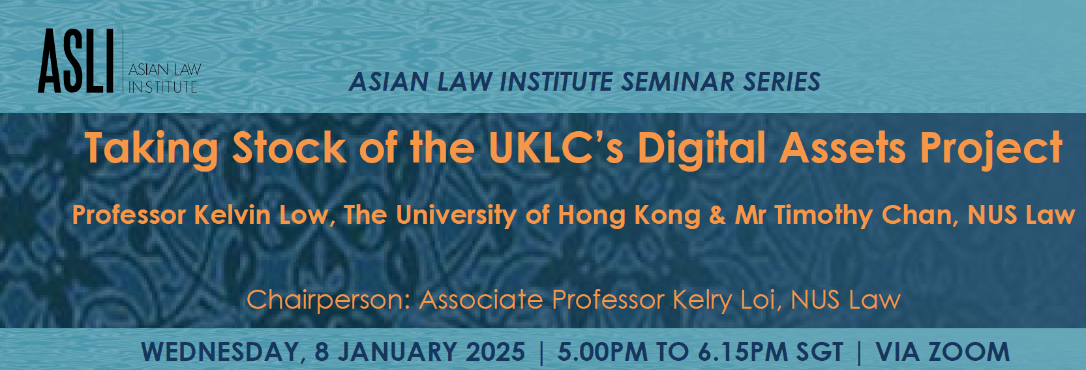Description
ABOUT THE WEBINAR
Since 2018, the UK Law Commission has been working on issues at the intersection on law and technology, of which perhaps the most notable output is its work on digital assets. The Commission’s work has led to the publication of several important reports and recommendations, culminating in the Property (Digital Assets etc) Bill 2024. Beyond legislative reform, the Commission’s proposals have garnered significant influence in the English courts, and it is only a matter of time before they fall to be considered by the Singapore courts. Yet, prominent academic commentators have critiqued the Commission’s proposals for inconsistency with fundamental concepts in property law. This seminar will review the state of play and critically evaluate the Commission’s recommendations relating to the proprietary nature of cryptoassets and the concept of “control”.
ABOUT THE SPEAKER
Kelvin F.K. Low read law at the National University of Singapore and Oxford University. Before his current appointment at the University of Hong Kong, he held previous appointments at National University of Singapore, Singapore Management University, and City University of Hong Kong. His research interest spans the field of private law but with a particular interest in property, broadly defined. He has published internationally with leading journals such as the American Journal of Comparative Law, the International & Comparative Law Quarterly, Legal Studies, Lloyd’s Maritime and Commercial Law Quarterly, the Law Quarterly Review, the Melbourne University Law Review, and the Modern Law Review. He is a co-author (together with Michael Bridge, Louise Gullifer, and Gerard McMeel) of the 2nd and 3rd editions of The Law of Personal Property, and co-author (together with Tang Hang Wu) of the 3rd and 4th editions of Tan Sook Yee’s Principles of Singapore Land Law. His works have been cited by the courts in Australia, Canada, England and Wales, Hong Kong SAR, Malaysia, New Zealand, and Singapore as well as law commissions and law reform bodies in Australia, England and Wales, Ireland, New Zealand, Scotland, and Singapore.
Timothy Chan is a Sheridan Fellow at the National University of Singapore. He works on private law and private law theory generally, with a focus on property law, equity, and the intersection of established doctrines with digital assets. His ongoing doctoral research at Harvard Law School explores various issues relating to property theory and intangible property. His work has appeared or is forthcoming in leading journals such as the Modern Law Review, the Law Quarterly Review, Legal Studies, and the Singapore Journal of Legal Studies. Prior to joining the Faculty, Timothy practiced commercial litigation in a leading firm, where he acted in banking litigation and in joint venture disputes.
Date and Time
Wednesday, 8th January 2025 5:00PM GMT+08:00
to
Wednesday, 8th January 2025 6:15PM GMT+08:00
Organisation
Faculty of Law
Contact Email
asli@nus.edu.sg
Location
via Zoom





